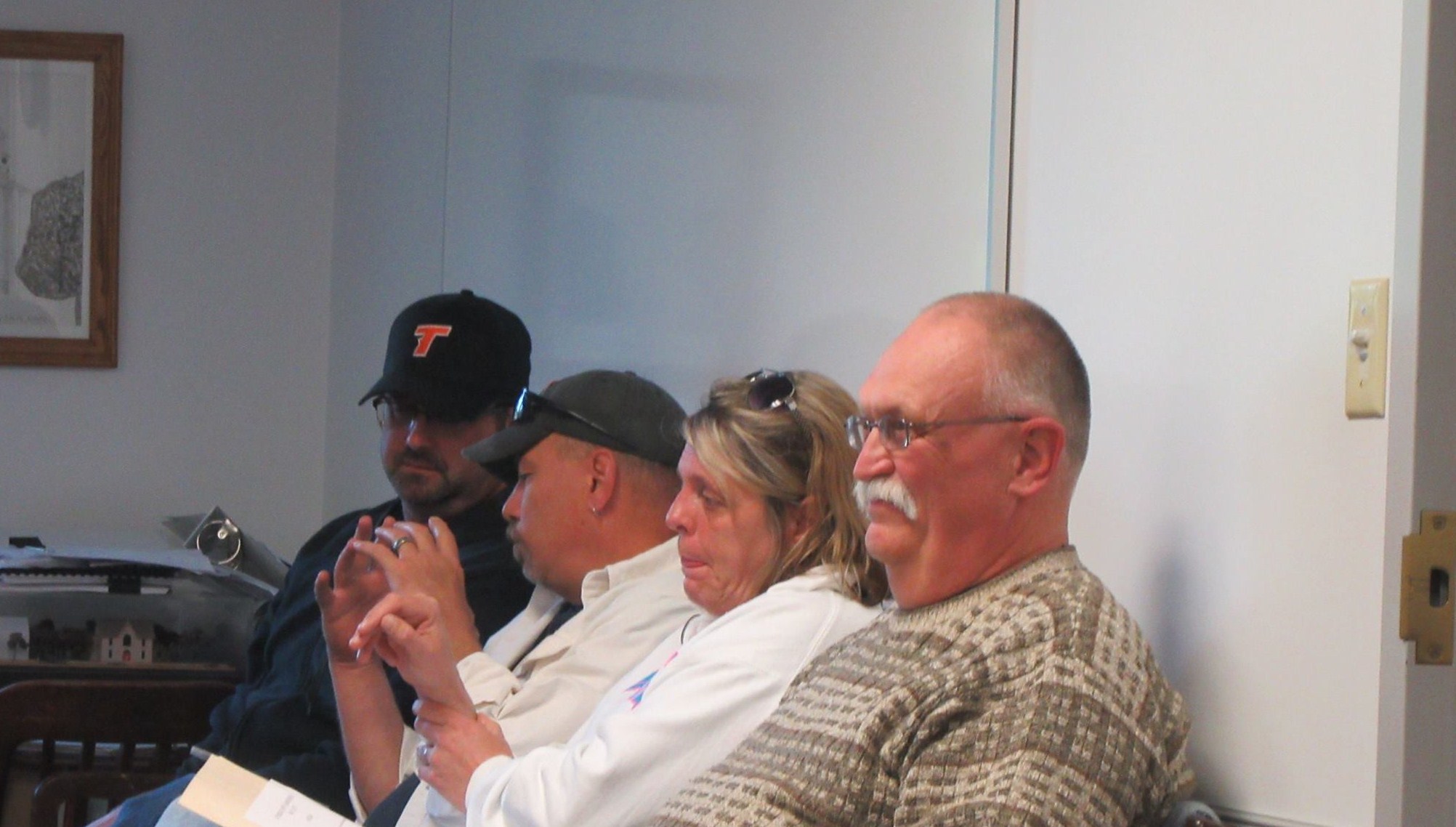Forkston Township residents (top, from left) David Baltrusaitis, Lenny and Lizz DeWolfe, and Kevin Ray listen as Wyoming County Commissioner Tom Henry (above) reads a letter from PA DCED that the commissioners feel sufficiently ties together all of the loose ends concerning the flood property buyout process as it pertains to the CDBG-DR block grant that was awarded to Meshoppen Borough in March.
Photos and Story by Rick Hiduk
As far as the Wyoming County Commissioners are concerned, the flood property buyout saga that has dominated their public meetings for the past two months has been settled. A letter issued to the commissioners by Kathy Possinger, director of DCED’s Center for Compliance, Monitoring and Training not only details the criteria for CDBG-DR grants but commends the county for properly following the application process.
On May 10, the commissioners participated in a conference call with numerous state representatives, during which issues concerning the protocol by which the county successfully applied for and was awarded $2.45 million was finally discussed in depth. Prior to this, communication was fragmented and resulted in a frustrating battle of finger pointing, name calling, and mistrust.
After an initial round of PEMA buyouts of properties flooded in 2011, DCED was made aware of the availability of $8 million in US Department of Housing and Urban Development (HUD) funds to address unmet needs. Possinger noted that 17 applications (projects) were submitted from the 36 affected counties exceeding $16.7 million in requests.
That included projects associated with 80 homes in Wyoming County, including Meshoppen Borough; Eaton, Forkston, Braintrim and Exeter townships; and other municipalities. As had been noted during previous discussions, CDBG funds, in general, are meant to assist low- to moderate-income (LMI) communities. Among the applications submitted on behalf of the county, only Meshoppen qualified as a LMI community.
“Applications demonstrating a benefit to a (LMI) area, as defined by the American Community Survey data, received an additional 15 points during the ranking and review process,” Possinger explained. She further noted that the county would not have received any funding had the projects not been broken down the way they were.
Lizz DeWolfe is among the residents of Forkston and other municipalities who have been battling the commissioners for clarity on the criteria for the CDBG-DR grant. She recently received a copy of a letter from the office of Sen. Lisa Baker who, along with Rep. Karen Boback, petitioned DCED and PEMA for answers to a number of related questions.
The responses to Baker confirmed that Wyoming County EMA and the Housing Authority did prioritize the applications before they were submitted to committee for review – a charge that EMA director Gene Dziak had denied as it had been posed to him at previous meetings.
According to Henry, Possinger suggested during the phone conference that “things were taken out of context” over the past eight weeks while a combination of public officials and private citizens were simultaneously asking questions about and seeking answers pertaining to various aspects of a very complicated process. “They understand that things got confusing,” Henry related.
In her letter, Possinger actually congratulated Wyoming County’s “team’s effort to stratify its projects,” adding, “In so doing, one of the county’s projects (Meshoppen Borough) ranked among the top submissions and secured nearly 30% of available funds.”
“This is their letter telling us that we did things correctly…and that we would not have gotten any money if it was not done correctly,” said Henry, figurative closing the door to an often ugly battle over the grant.
“The good news is, we got $2.4 million,” Dziak said on Tuesday. “The bad news is that we couldn’t fund all the applications.”
Another aspect of the grant process that was unclear in the past is where any unused portion of the currently available funds might go. Dziak had suggested that, if landowners in Meshoppen did not accept the appraisals given their home and therefore refused the buyouts, the money could be used for other municipalities in the county.
That is not the case, said Henry. Any unused funds will be returned to Harrisburg. “We’re hoping that, if enough people call the state, that the money will come back here,” Henry remarked. “I think it would be insane for them not to send it back to the people.”
“As these programs become available, we’re going to jump on them,” said Dziak. The group of applications Dziak refers to as Project II that was not accepted for the CDBG-DR grant, for example, is ready to be resubmitted at a moment’s notice should additional funds become available.
Not surprisingly, the news did not sit well with the Forkston area residents in attendance, whose homes were flooded as many as three times in 2011. For David Bultrusaitus, not getting the buyout after the prolonged fight and subsequent attention brought to the plight of Forkston Township residents was figuratively another nail in the coffin for his property.
“Our homes are unmarketable right now,” he lamented, adding that the cost of his flood insurance increases dramatically each year.
In addition to the commissioners and Dziak, the letter from Possinger was copied to Mark Smith and Cassandra Coleman in the governors office; Jennifer Wilson and Tom Yoniski in Sen. Baker’s office; Brenda Zablotsky in Rep. Boback’s office; and Donna Enrico, Paul Macknosky, Jeffrey Allen, and David Grey at DCED. Henry said that all parties involved agreed to be contacted by county officials and residents to answer questions concerning the flood buyouts.
The question arose as to whether the state would ever offer money to Wyoming County again after such a lengthy battle at this end. On the contrary, Henry suggested in reference to efforts of the residents and officials to find clarity on the issue, “I think they realize now how serious we are about it.”



2 Comments